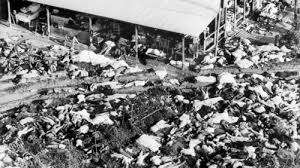massacre
英 [ˈmæs.ə.kər]
美 [ˈmæs.ə.kɚ]
- vt. 残杀;彻底击败
- n. 大屠杀;惨败
- n. (Massacre)人名;(法)马萨克尔
使用频率:

记忆方法
将“massacre”分解为“mass”和“acre”。想象有一大片(mass)土地,上面发生了一场残忍的屠杀(acreage turned into blood),这样就能形象地记住“massacre”意味着大规模的屠杀或破坏。
以上内容由AI生成, 仅供参考和借鉴
中文词源
massacre 屠杀
来自古法语macacre,屠宰屋,肉屠宰场,来自Proto-Germanic*maitana,砍,劈,来自PIE*mai,砍,劈,词源同maim,mangle,smith.后用于指对人的屠杀,大屠杀。
英语词源
- massacre (v.)
- 1580s, from Middle French massacrer "to slaughter" (16c.), from massacre (n.) "wholesale slaughter, carnage" (see massacre (n.)). Related: Massacred; massacring.
- massacre (n.)
- 1580s, from Middle French massacre "wholesale slaughter, carnage," from Old French macacre, macecle "slaughterhouse, butchery," of unknown origin; perhaps related to Latin macellum "provisions store, butcher shop."
权威例句
- 1. The massacre laid bare the moral bankruptcy of the regime.
- 大屠杀使该政权的道德沦丧暴露无遗。
- 2. In March 1770, there occurred what became known as the Boston Massacre.
- 1770年3月在那里发生了后来闻名的波士顿惨案。
- 3. Most of them had only heard of the massacre at second hand.
- 他们中的大多数人只是听说了那次大屠杀。
- 4. Is the massacre likely to touch off a new round of violence?
- 大屠杀有可能触发新一轮的暴行吗?
- 5. Maria lost her 62-year-old mother in the massacre.
- 在大屠杀中玛丽亚失去了62岁的母亲。